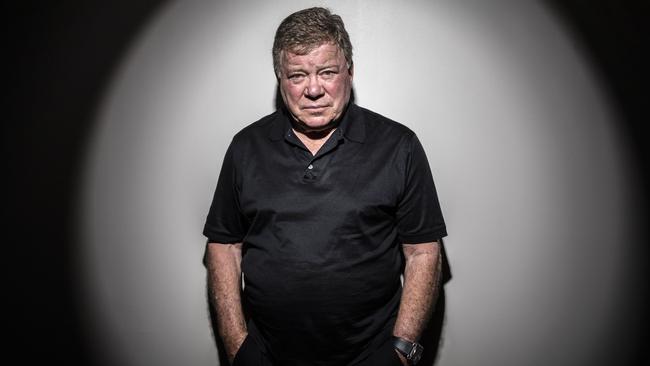William Shatner boldly goes into his past
Star Trek’s original leading man is approaching 90 but continues to goes boldly, with a new book just one of his projects.

At age 87, life for William Shatner has never been busier. He is still acting and producing, and has written a new memoir. A Christmas album is out soon. He continues to do charitable work and makes appearances at fan conventions. And he is about to tour Australia with his one-man show.
Shatner is a life affirmer. He is the personification of the opening monologue of the Star Trek television series, which he voiced as the intrepid James T. Kirk, captain of the starship USS Enterprise, promising to boldly go where no man has gone before.
“The window between birth and death is so narrow that it requires all of us to say yes to the adventure of life, to the odd mystery of life, and to take chances, and to say yes to the joy,” he tells Review.
In Shatner’s deeply personal and surprisingly candid memoir Live Long and … (one of several he has written) he opens up about his troubled relationship with his mother, his difficulty finding happiness, the “absence of love” in his life, his four marriages, and a fear of loneliness. “Your childhood incidences which seemed innocuous suddenly become profound and as you reach a certain age and you begin to think of death,” Shatner says.
“I decided to write about all those subjects. I did it for my kids; I wanted them to know how I felt about those things.”
There are plenty of interesting anecdotes from his acting career, but what makes the book worthwhile is the deeper self-examination of a life that must be constantly challenged. Shatner tells me he does not presume to give “advice” but does hope readers find it useful.
Shatner, he readily concedes, is a cultural phenomenon. “I have done so much other work that it really has just become Shatner,” he says. Although he has appeared in hundreds of plays, television shows and movies — and won an Emmy for playing Denny Crane in Boston Legal — it all began with Star Trek.
The classic sci-fi series, which burst on to television screens in 1966, featured a crew of intergalactic explorers in the 23rd century.
They brought energy, intelligence and humour to their five-year mission to seek out new life and new civilisations. Children and adults watched as they were beamed down to planets and fired phasers, spoke on communicators and translated Klingon.
The relationships between the crew were the essence of the show: Spock (Leonard Nimoy), McCoy (DeForest Kelley), Sulu (George Takei), Chekov (Walter Koenig), Uhura (Nichelle Nichols) and Scotty (James Doohan). The diverse cast represented a common humanity — apart from Spock, who was half human and half Vulcan — in an unexplored universe. “Star Trek is representative of good science fiction because it helps us to speculate with our imagination as to what might be out there,” Shatner says. “Whether we will ever know if there is life throughout the universe is impossible to tell, but in the meantime, we speculate on what might be out there, and that is the charm of Star Trek.”
Leaving aside the overacting, shaky sets and rubber-masked aliens, Star Trek grappled with difficult issues such as race, gender and religion. Shatner and Nichols shared the first interracial kiss on television. The three-year series offered a more thoughtful approach to science fiction than anything before, like Flash Gordon, or after, such as Star Wars.
Shatner describes Nimoy as akin to a brother. But their friendship ended shortly before Nimoy died in 2015. Shatner did not go to the funeral because he did not feel welcome. “It is a mystery,” Shatner reflects. “Leonard died and took the answer with him to his grave.”
But there is a clue in Shatner’s new book. “I didn’t know how to be a friend,” he writes. In other words, he did not fully appreciate or nurture the relationship with Nimoy. It is no surprise that his other Star Trek co-stars found him arrogant, overbearing and selfish. Shatner was unaware of these feelings.
He has also often had a difficult relationship with fans. In a skit for Saturday Night Live, he told Trekkies to “get a life”. It was meant to be humorous. But it was the fans who sustained interest in Star Trek, which became more popular in syndication. Fifty years later, it continues to be reimagined with six spin-off series and 13 films, and more in development.
Shatner, who first visited Australia in 1969, is looking forward to bringing his stage show back for a four-city tour. It combines stories, songs and jokes, with some added Shatner wisdom thrown in for good measure. “It’s one of the best things I’ve ever done,” he says.
Patrick Stewart recently announced he was returning to the role of captain Jean-Luc Picard from Star Trek: The Next Generation. Would Shatner like to bring back Kirk, who was killed off in the 1994 film Star Trek: Generations?
“Galloping. Around. The. Cosmos. Is. A. Game. For. The. Young,” Kirk once said to McCoy. But Shatner wouldn’t be Shatner if he wasn’t continuing to boldly go.
“If they wrote something really good that appealed to me, and it was good for the character, I certainly would consider coming back,” he says.
William Shatner’s Live Long and … What I Learned Along the Way is published by Pan Macmillan Australia. Shatner’s World plays in Perth, Brisbane, Sydney and Melbourne from Monday to Wednesday.


